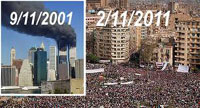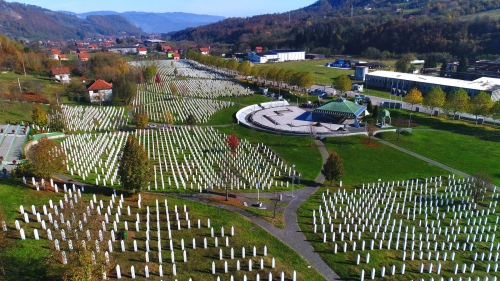The Antidote to 9/11?
 |
There's been a ton of punditry about what the Tunisia and Egypt revolutions mean for America, and you can bet there'll be several tons more. But I suspect its biggest effect is yet to register, and that is psychological. Because these two revolutions - achieved through determinedly non-violent action - constitute a radical, positive challenge to the politically manipulated atmosphere of fear and paranoia about Islam. In fact, as New York Times columnist Roger Cohen put it, 2/11 may be the perfect antidote to 9/11.
Too optimistic? I think not. There's a very good chance that we're due for a major paradigm shift here in the United States - one that seemed unimaginable just a few weeks ago (and one even a congressman like Peter King, head of the HUAC-like committee due to start 'examining' the supposed radicalization of American Muslims ("are you now or have you ever been an American Muslim?"), might have to take into account).
What's happening all over the Middle East challenges the crude stereotypes of "Arabs = riots." Of "Islam = terrorism." And above all, of Islam as somehow fundamentally anti-democratic.
These stereotypes run deep. Think of the scenes shown in the American media from the first week of the Egypt uprising. A close-up of 200 people prostrated in prayer, excluding the tens of thousands who stood behind them, not praying. A protestor holding a poster of Mubarak with horns and a Star of David drawn on his forehead - the only one of its kind, it turned out, in the whole square. Or a few days later, the replay after replay of Molotov cocktails - "flames lead" being the mantra of TV news - reinforcing the image of rioting Muslims out of control, "the Arab street." It was exactly the image Mubarak was aiming for.
Thus the pumping up of the Muslim Brotherhood as a threat by both the Mubarak regime and conservative western pundits, as though the Egyptian protesters were extraordinarily dumb and nave. As though they were not highly aware of how the 1979 Iran revolution was hijacked and perverted. As though they couldn't see the fundamentalist regime in Saudi Arabia or the Hamas regime in Gaza. As though the Brotherhood itself were unanimously stuck in the 1950s mindset of ideologue Sayyid Qutb. As though the only way to be Muslim was to be a radical fundamentalist.
Thus the surprise in the west at the sophistication of the Tahriris, when "the Arab street" turned out to include doctors and lawyers and women and IT executives (you could practically hear the astonishment: "you mean there's Muslim Google executives?").
Thus the continually stated fear, stoked by the regime and by conservative pundits, that the protestors would shift from nonviolence to violence - that the nonviolence was merely a cover for some assumed innate propensity to violence.
Thus the slowness to realize that the old anti-West sloganism had been superseded, and that this wasn't about resentment of the west; in fact that it was about the very things President Obama had talked about in his speech right there in Cairo in June 2009 - about democracy and freedom.
In short, what we heard and saw in those first few days was the modern version of Orientalism: The idea that the 'Orient' - that is, the Middle East (it should come as no surprise here that the geography is as weird as the idea itself) - is an inherently violent, primitive, medieval kind of place. Or as right-wing Israeli politicians have been endlessly repeating for decades, "a bad neighborhood." And that the responsibility of 'enlightened' westerners and despotic leaders alike was to keep these benighted people under control.
But as the uprising went on into the second week, something began to change. Nobody at the blog of Seattle's alternative newspaper The Stranger, for example, which one would have thought the first to support any kind of uprising, even bothered to comment on it at first. When they began to, it was with their usual weary stance of pseudo-sophisticated cynicism. But by the day after Mubarak unleashed his goons in Tahrir Square, when the protestors' response was to turn out in larger numbers than ever, even The Stranger gave in to excited support. How not, when millions of people stood up to repression and dictatorship in the full knowledge of what they faced if they failed - arrest, torture, and death? Would you have such courage? Such determination?
So here's what I saw here in the States: more and more Americans abandoning their unconscious Orientalism in favor of stunned admiration.
And that's the beginning of something new, the very thing Obama declared twenty months ago in Cairo: respect.
Finally.
Source: The Accidental Theologist - Lesley Hazleton
Topics: Conflicts And War, Egypt, Government And Politics, Tunisia
Views: 2941
Related Suggestions

















